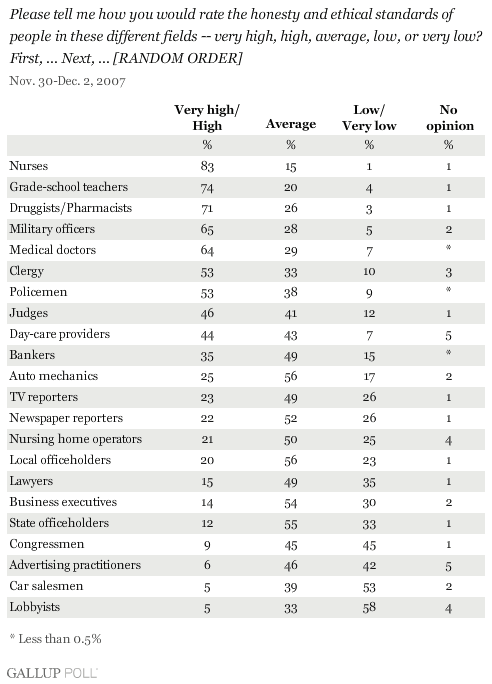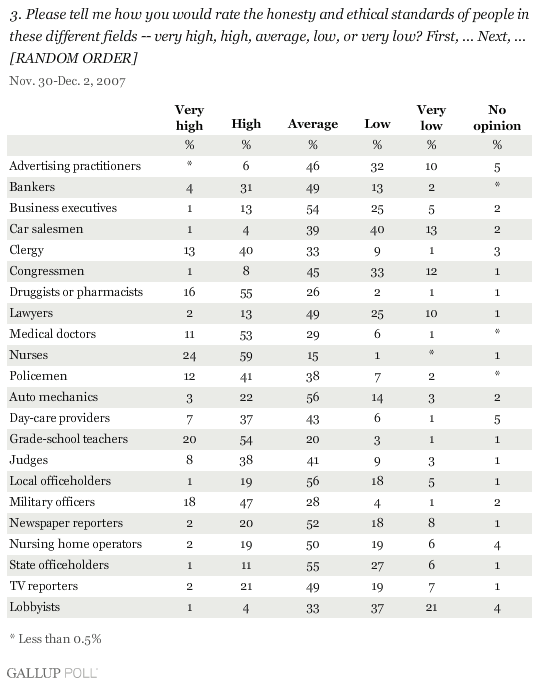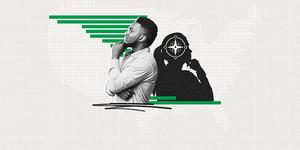PRINCETON, NJ -- Gallup's annual update on the honesty and ethical standards of people in various professions finds a new entry ranking at the bottom of the list. For the first time, Gallup asked the public to rate the honesty and ethical standards of lobbyists, and only 5% describe their ethics as "very high" or "high." Lobbyists, car salesmen (5%), and advertising practitioners (6%) are the lowest-rated professions. Nurses, typically the top-rated profession each year, again get the highest ratings. Ratings of congressmen are the worst Gallup has ever recorded.
The Nov. 30-Dec. 2 USA Today/Gallup poll asked Americans to rate the honesty and ethical standards of people in each of 22 different professions, using a five-point scale ranging from "very high" to "very low."
Eighty-three percent of Americans rate nurses' honesty and ethical standards as very high or high, easily the most positively rated profession. Nurses were first included in 1999 and have averaged an 81% very high/high rating since then. That has been good for first place each year except 2001, when firefighters were included after the 9/11 terrorist attacks and received a 90% rating.
After nurses, grade-school teachers (74%) and pharmacists (71%) are rated next most highly this year. Just under two-thirds of Americans give high ratings to military officers and medical doctors. Clergy and policemen are the only other two professions that receive positive ratings above 50%.
As is typically the case, politicians do not fare that well, but local officeholders (20%) are rated better than state officeholders (12%) and congressmen (9%). In fact, congressmen rank above only lobbyists, car salesmen, and advertising practitioners this year. Lawyers (15%) and business executives (14%) also receive relatively poor ratings.
The results for each of the 22 professions tested in this year's poll are shown in the accompanying table.

Gallup first asked the honesty and ethics question in 1976. Eleven professions are included every year, while additional professions are included on a rotating basis. The annually rated professions are advertising practitioners, bankers, business executives, car salesmen, clergy, congressmen, pharmacists, lawyers, medical doctors, nurses, and policemen.
Absent a major scandal or crisis in the news relating to one of the professions, the ratings of each tend to be stable from year to year. This year, there are some modest changes, all of which reflect a decline in perceived honesty.
Ratings of clergy (down from 58% in 2006 to 53% this year) and medical doctors (69% to 64%) are both down five percentage points. In both cases, however, the decreases result in a return to prior levels after slightly higher ratings in 2006.
The public's ratings of congressmen (14% to 9%), advertising practitioners (11% to 6%), and business executives (18% to 14%) also show significant drops, but not a return to previous levels. In fact, all three have established new lows. The score for congressmen is less than half of what it was in 2004, down from 20% in that year's poll.
Ratings of state and local officeholders have also declined compared with 2004, when Gallup last asked the public about them. Twenty-four percent of Americans gave state officeholders high marks for honesty and ethics in 2004, but only 12% do so today. The change has been smaller, though still statistically significant, for local officeholders (26% in 2004 and 20% today).
The honesty and ethical standards of several other professions are viewed less positively today than in 2004, including military officers (72% to 65%), judges (53% to 46%), and day-care providers (49% to 44%).
Of all the professions tested in this year's poll, only nurses have shown significant improvement from three years ago (79% to 83%).
Survey Methods
These results are based on telephone interviews with a randomly selected national sample of 1,006 adults, aged 18 and older, conducted Nov. 30-Dec. 2, 2007. For results based on this sample, one can say with 95% confidence that the maximum error attributable to sampling and other random effects is ±3 percentage points. In addition to sampling error, question wording and practical difficulties in conducting surveys can introduce error or bias into the findings of public opinion polls.

